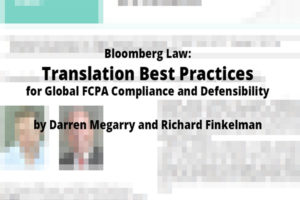The DOJ recently increased its Foreign Corrupt Practices Act (FCPA) Enforcement unit by more than 50% and the FBI tripled the number of agents focused on overseas bribery. Furthermore, there are currently 75 companies that are the subject of an ongoing and unresolved FCPA-related investigation and at least 77 other companies suspected to be the target of an ongoing FCPA investigation. With more than 52 countries involved in these investigations it raises the question of how to best establish compliance programs that span multiple borders and foreign languages.
In our globalized world, translation and localization are essential to international compliance programs. One of the best way to minimize risk and follow the DOJ’s guidelines for effective compliance is to translate and localize all compliance-related documentation into the local language for employees and third party suppliers. Offering compliance materials in the native language helps ensure that your program is as effective as possible and can help you avoid issues as in the recent SEC actions against Nortek Inc. and Akamai Technologies.
Based on our work with organizations including TE Connectivity and HP this article will explain:
- Why companies need a global compliance program that meets the DOJ’s hallmarks of effective compliance.
- Why translation into the local language is essential for employees and 3rd parties in other countries.
- How to translate compliance training materials, anti-corruption declarations, due diligence questionnaires and contracts efficiently and effectively.

